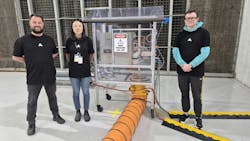Stralis Aircraft Advances Hydrogen Fuel Cell Technology at Auckland Facility
Stralis Aircraft is testing its high-temperature fuel cell technology in an Auckland test facility. The company is an Australian clean-tech startup working to enable Australasia’s first hydrogen-electric flights.
This hydrogen fuel cell testing has been made possible with the support of Air New Zealand, Hiringa Energy and the NZ Product Accelerator hosted by University of Auckland.
Stralis Aircraft is developing fuel cells to power hydrogen-electric propulsion systems for aircraft and other heavy transport applications that offer high performance and low operating costs.
Their proprietary high temperature PEM fuel-cell technology is lighter than alternatives, enabling aircraft to fly ten times further than battery-electric solutions at a lower cost than fossil-fuel-powered planes. The company is already testing its fuel cells in the U.S. and Japan but has now started testing closer to home in New Zealand.
The testing will provide data to help Stralis understand degradation mechanisms and degradation rates to support a credible lifetime assessment for the fuel cell system product.
Achieving long life HTPEM fuel cells is important to deliver engine maintenance cost savings to airline customers. This measured data will help quantify maintenance savings and encourage adoption of the technology.
Stralis’s propulsion technology delivers benefits like:
- Zero emissions (producing only water vapor)
- Up to 50% lower operating costs
- Reduced noise
Their system integrates their fuel cells, liquid hydrogen tanks, and electric motors into existing and new aircraft designs. It plans to achieve the first flight of its six-seat Bonanza A36 technology demonstrator aircraft later in 2025 in Queensland, Australia.
Stuart Johnstone, co-founder and CTO of Stralis Aircraft says, “We are proud to be working with Air New Zealand to test our unique fuel cell technology in their engine test facility at Auckland Airport. New Zealand is an ideal location to develop, test and adopt emission free aircraft technology, so it is a great place to build capability and understanding.”
Johnstone continued, “The test cell is attractive because it has lots of capacity to grow and enable testing of our higher power systems. It is great to be working with businesses in Australasia to make hydrogen-electric and zero-emission aviation a reality. With the help of our Kiwi partners, we have managed to get the test cell operational in “record” time”.
Air New Zealand’s Sustainability Lead Energy Transition Matthew Connolly says, “Across Air New Zealand we have a significant programme dedicated to preparing for the future of flight, and the energy transition is a critical part of this work.”
Connolly added, “That’s where opening the engine test cell facility to innovative companies such as Stralis comes in, as another step in our collective learning about new technologies, future engine propulsion, and new ways that aircraft will fly people and goods in a lower-carbon future.”
“We believe Sustainable Aviation Fuel (SAF), hydrogen and electricity will all be critical parts of a future aviation eco-system, and we’re proud to be supporting the innovation that Stralis is testing here in New Zealand,” he concluded.
Hydrogen-electric propulsion systems have fewer moving parts and operate at lower temperatures compared to existing aircraft engines, which is predicted to reduce engine maintenance costs by between 40-60%. This is similar to the maintenance cost reductions seen between combustion engine and electric cars.
The hydrogen, stored onboard in a tank, powers a fuel cell that generates electricity to power an electric motor, which drives a propellor. Hydrogen-electric propulsion systems can be used for applications like:
- Aircraft battery replacement
- Retrofit airframes
- New clean sheet designs
- Auxiliary power units (APUs)
